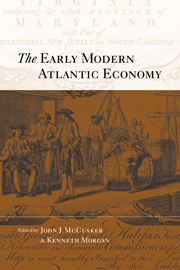Book contents
- Frontmatter
- Contents
- List of figures
- List of tables
- List of abbreviations
- List of contributors
- Dedication
- Introduction
- Part I The role of merchants and their connections
- 1 Risk, credit and kinship in early modern enterprise
- 2 Business networks in the British export trade to North America, 1750–1800
- Part II The development of trades
- Part III Imperial economies
- Part IV Colonial working societies
- Index
1 - Risk, credit and kinship in early modern enterprise
from Part I - The role of merchants and their connections
Published online by Cambridge University Press: 16 October 2009
- Frontmatter
- Contents
- List of figures
- List of tables
- List of abbreviations
- List of contributors
- Dedication
- Introduction
- Part I The role of merchants and their connections
- 1 Risk, credit and kinship in early modern enterprise
- 2 Business networks in the British export trade to North America, 1750–1800
- Part II The development of trades
- Part III Imperial economies
- Part IV Colonial working societies
- Index
Summary
This contribution to a volume honouring Jacob Price and celebrating his work takes as its themes risk, credit and kinship in the early modern period, exploring the ways in which they interacted to condition business strategies and the day-to-day conduct of business. It seeks to survey and assess generally rather than to add to research. Considerations about kinship, credit, risk and the avoidance of risk have suffused all of Jacob Price's investigations into transatlantic trade and finance in the seventeenth and eighteenth centuries, either explicitly or as a structural feature of the context. Indeed, because uncertainty and risk were almost universally present to so much greater an extent in ‘normal’ trading activities in that period than in conducting equivalent transactions in the twentieth century they conditioned the operation of the business system in an elemental way. Nor can risk be easily distinguished from uncertainty in the commonly assumed modern conceptual sense – where risk can supposedly be quantified (a precondition for commercial insurance) and uncertainty not. Many categories of risk had uncertainties also built into them and were in large measure open ended. Focusing attention on avoiding or minimizing risk may imply taking too negative or too defensive a view about the conduct of business in this period.
- Type
- Chapter
- Information
- The Early Modern Atlantic Economy , pp. 15 - 35Publisher: Cambridge University PressPrint publication year: 2001
- 6
- Cited by



